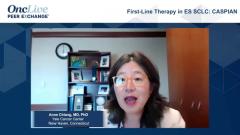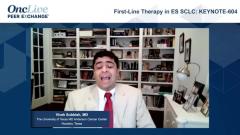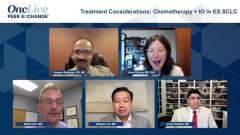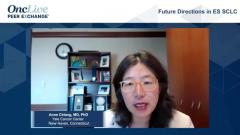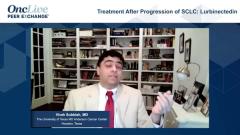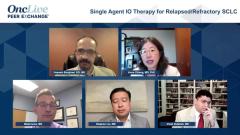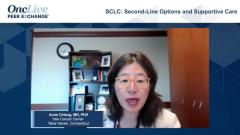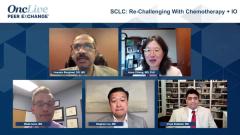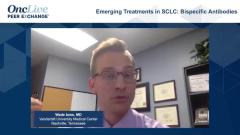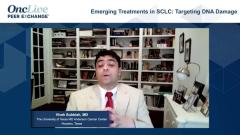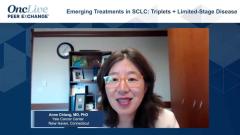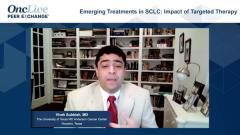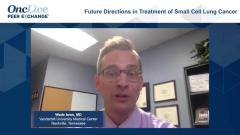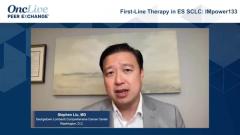
Future Directions in Treatment of Small Cell Lung Cancer
Panelists conclude their discussion by commenting on areas of unmet need and sharing personal perspectives on factors that may change clinical practice for SCLC in the future.
Episodes in this series

Hossein Borghaei, DO, MS: What do you think is going to change the clinical practice in the next couple of years in small cell lung cancer, whether it’s limited or extensive stage? Anne, feel free to say it’s your ipilimumab-nivolumab study in that group. Don’t be shy about it.
Anne Chiang, MD, PhD: Great question. There are a couple of things that are really exciting. We just had results from the IMpower010 trial regarding adjuvant atezolizumab for early-stage cancers. Interestingly enough, in recent months, I’ve seen a number of incidentally found patients with early-stage small cell lung cancer who have undergone resection for early stage disease. There may actually be a role for surgery followed by adjuvant I/O [immuno-oncology]. I certainly think with the more liberalizing of the US Preventive Services Task Force indications for low-dose screening CT, we might see a few more early-stage small cell lung cancers being diagnosed. That’s 1 thing.
I agree with folks talking about the molecular subtypes. We’ll be potentially looking at the Lung-MAP trial or an adaptive clinical trial strategy that helps randomize or sort patients by their molecular subtype for a certain therapeutic strategy. Also, stay tuned for the ipilimumab-nivolumab or the anti-CTLA4 PD-1 results. We’re going to make strides in understanding the biology of small cell lung cancer. We’re going to hopefully understand more about what determines response to checkpoint inhibitors. Perhaps it’s as simple as getting those T cells in to make a difference. I do think that the holy grail for small cell lung cancer in some ways is being able to treat it like EGFR, as different subtypes that have different therapeutic approaches. Understanding more about the biology will help us understand the disease and help the patients.
Hossein Borghaei, DO, MS: Thank you, Anne. That was wonderful. Wade?
Wade Iams, MD: I’m going to go with consolidative checkpoint inhibitors in limited-stage disease, and I’d like to interject a personal research interest. I hope that blood-based assays of circulating tumor DNA can best inform patient selection, ideally linked to subtype. Hopefully you hear much more from me in the years to come about that.
Hossein Borghaei, DO, MS: We’re looking forward to it. Thank you. Vivek?
Vivek Subbiah, MD: I completely agree with what Anne and Wade said. We need more effective strategies for each of these subgroups in clinical trials. More patients should be enrolled in clinical trials, especially in the first-line setting, second-line setting, and third-line setting to answer these questions. As I said earlier, the small cell lung cancer field is about 15 years behind the non–small cell lung cancer field. I’m sure there’s going to be a future renaissance of biomarkers and personalized therapy. Defining the subsets in small cell lung cancer represents the first step in our understanding of what drugs work best for which patient, at least preclinically. It at least gives us a guide for a path forward for personalized approaches for small cell lung cancer.
One of the main challenges we face in small cell lung cancer and any small cell tumor with neuroendocrine phenotype or genotype is that they often quickly develop resistance to treatment, even after the initial response. To determine what causes resistance, we need to also study the biology of the resistance mechanisms. We’ll understand the response mechanisms, of course, but the key is to understand the resistance mechanisms in these patients. I want everyone in this field to come together to define biomarker-driven clinical trials and also participate in co–clinical trials and PDX-driven co–clinical trials to understand the resistance mechanisms so that this may guide us for precision therapies in the future. We are hopeful. Thank you.
Hossein Borghaei, DO, MS: Thank you. Stephen, we’re going end it with you.
Stephen Liu, MD: The most immediate change will be radiation. As Wade said, in limited-stage disease, it’s a slam dunk. I also think the consolidative radiation therapy in extensive-stage disease will probably be positive as well in the right subset. Adding radiation will be big. We’ve got new drugs, including nal-IRI [nanoliposomal irinotecan] and AMG 757. These are going to be impactful drugs.
We’re going to see some of the old drugs make a comeback when we start using them in the right way. When we start using them with biomarkers, we’re going to see Aurora-A kinase inhibitors and maybe MMP. We’re going to see these old drugs find a home. We were just using them wrong. I’m hoping that 10 years from now, the biggest change will be less small cell lung cancer. Unlike a lot of other cancers, small cell lung cancer is largely preventable with smoking cessation. This is 1 where we can make an impact in preventive medicine as well.
Hossein Borghaei, DO, MS: Thank you so much. Thanks to all of you for this wonderful and informative discussion. Thank you for your final thoughts on where we’re going in small cell. Those are all really great thoughts. I’d also like to thank our viewing audience. We hope that you found this OncLive® Peer Exchange® discussion to be useful and informative. Thank you.
Transcript Edited for Clarity


